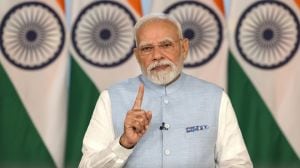Citizens cry it’s rape of democracy, Govt works hard to find who caught the rapist
The noise and din of Indian democracy is always at its most amusing—if you have the stomach for that kind of amusement—during elec...

The noise and din of Indian democracy is always at its most amusing—if you have the stomach for that kind of amusement—during election times. Strange spectacles presented by those vying for power present little surprise. The Judeo incident, however, must be acknowledged as something which is beyond the ordinary.
The existence of corruption in politics is as well-known as the existence of kerosene (now even acetylene) in gasoline and water in milk. What is, however, extraordinary is to see it in action—not B grade Bollywood movie good guys plying an evil-looking villain (moustache and all) with the customary Black Label and ‘‘presenting’’ him with gesture of affection translated into cash—but to see it in real life with a Union Cabinet minister starring in person as the gentleman caught in the act.
And this is where humour of the citizen gives way to chagrin.
The Government—the custodian of the rule of law—responds to this outrage with speed and is successful in very quickly finding out who betrayed the Minister! The citizenry cries that there has been a rape of democracy—the government swings into action to find out who caught the rapist with his pants down on reel!
If the story is not true—it is for the dramatis personae to establish its untruth and set the law in motion against those who have slandered him. This, however, does not appear to be the course of action pursued so far.
It appears that over two weeks after the first disclosure, an FIR has not been registered. The tape was good enough evidence for the PM to request the Minister to quit—an act of commendable righteousness! However, our law-enforcement agencies do not seem to find it sufficient information of the commission of an offence—which is all that is required to register an FIR.
Evidence follows investigation and is the result of it. At this stage all that is required is information as to the commission of an offence — which is writ large on the face of the visuals. Strange are the ways of our administration — perhaps beyond the comprehension of us lesser mortals. If the story is true, it matters little as to who exposed the misdeeds of the minister nor are the motives of the persons behind the ‘‘sting’’ relevant. The principal objection to this kind of a sting operation stems from the oft quoted much misunderstood right to privacy.
The genesis of this right was principally a safeguard against unjustifiable intrusions by the government. It has evolved into a right to be left alone by the media and is, in our country, recognized as a facet of the right to life itself.
However, the right of a private person is qualitatively different from the right of a public figure—especially for those for whom public gaze is as necessary for survival as sunlight is for grass.
Besides, those who aspire for high office in a constitutional democracy are expected to set standards in behavior — the line between their personal life and public life gets increasingly thin.
The one defence that overcomes all objections to alleged violations of the right to privacy is public interest. It is my belief that, in the Indian context where corruption is like a cancer that threatens the existence of civil society and orderly government, the public interest in exposing a corrupt public servant far outweighs privacy.
We can forget only at our peril that rights such as those to privacy are luxuries which citizens enjoy in a constitutional government founded on the rule of law. If these rules are molded to shield corrupt public servants, it would be sawing the branch on which we are so precariously dangled.
Nobody can cavil with the suggestion that this country needs an ombudsman to fight corruption. But is it not better that all institutions of a democracy—and the media is the most powerful of them —share this burden?
Yes, there will be occasions when the powers of these institutions will be abused — like all liberties and powersare abused. But in the end, I can only recall the words of the Supreme Court in the Kartar Singh case: ‘‘Those who fill a public position must not be too thin-skinned in reference to them. It would happen that observations would be made upon public men which they know from the bottom of their hearts were undeserved and unjust; yet they must bear with them and submit to be misunderstood for a time…Whoever fills a public position renders himself open thereto. He must accept an attack as a necessary, though unpleasant, appendage to his office.’’
Photos





- 01
- 02
- 03
- 04
- 05

























